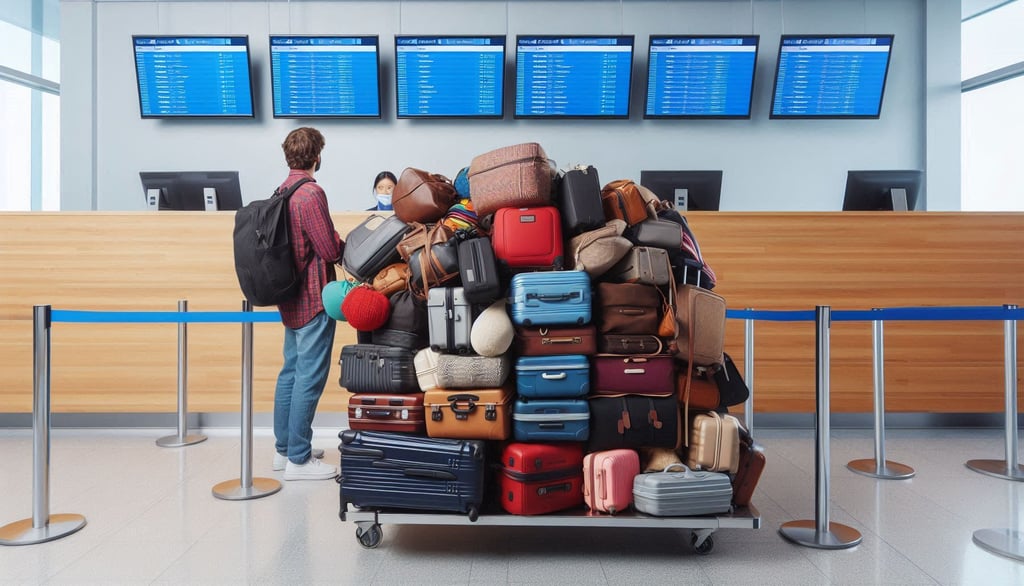Reevaluating Airline Baggage Policies: From Lose/Lose/Lose to Win/Win/Win
Can airlines go back from a lose/lose/lose scenario to a win/win/win scenario?


The Absence of Win/Win/Win in Airline Baggage Policies
Just yesterday, I found myself in a conversation with someone who has been working for over 40 years in the travel industry, about all the frustrations that current airline baggage (and seating) policies often create for their customers, and it’s not just the travellers who are affected.
Of course, there are travellers who don’t mind - less luggage means cheaper travel for them. But to me, it feels like these luggage policies create more of a lose/lose/lose scenario rather than a win/win/win. It makes me wonder if airlines are truly serving their stakeholders’ needs. While the shareholders might be satisfied, the answer is clearly ‘no’ when it comes to their client travellers, who, after all, are the lifeblood of any airline.
In the realm of air travel, the concept of win/win/win seems to be clearly absent, particularly when it comes to baggage policies. Airlines have shifted to complex baggage (and seating) fee structures, where booking a trip becomes more time-consuming and starts creating discontentment right from the reservation process due to all the extra costs added on top of the fare. This practice, while profitable for airlines, tends to create quite some dissatisfaction and frustration among travellers and airline staff.
The Traveler’s Perspective
Imagine arriving at the airport, only to discover that your small handbag, which you forgot to account for during booking, incurs an additional fee. While all costs are listed on the airline’s booking websites, this oversight can become a significant irritation, especially when the fee at the airport is even more expensive than if it had been included during the initial booking. This frustration can quickly turn a positive travel experience into a negative one, affecting the overall perception of the airline.
The Airline Staff’s Perspective
Airline personnel are on the front lines, tasked with enforcing these baggage policies. They are often the recipients of travellers’ anger and discontentment. The need to meticulously apply these rules to generate additional revenue can lead to daily aggressive conversations with passengers. Over time, this constant exposure to negativity can take a toll on staff morale, leading to burnout and high turnover rates. The very policies designed to increase profitability end up creating an inhospitable work environment, driving valuable employees away.
Why Did Airlines Shift to Complex Baggage Policies?
The shift to complex baggage (and seating) policies was primarily driven by the need to remain competitive in a market where base fares are often the deciding factor for travellers. By unbundling services and charging separately for baggage and seats, airlines could advertise lower base fares, attracting price-sensitive customers. However, this approach has led to a fragmented and often frustrating booking experience, where travellers feel nickel-and-dimed at every step.
The Philosophical Shift from Lose/Lose/Lose to Win/Win/Win
So, how can this situation be transformed from a lose/lose/lose scenario to a win/win/win scenario? The answer lies in rethinking the entire approach to pricing and customer experience (easier said than done?).
§ Revisiting All-Inclusive Fares - There was a time when the fare price included all luggage, and this simplicity contributed to a more harmonious travel experience. By slightly increasing fare prices to cover baggage costs, airlines can eliminate the frustration of unexpected fees. This approach fosters transparency and trust, leading to happier customers and less stressed staff. Everything comes with a price, but isn’t harmony an essential factor for everyone?
§ Creating an In-Between Scenario
Another clever solution could be an in-between scenario where airlines offer bundled packages that include baggage fees at a discounted rate. This approach maintains competitive base fares while providing an option for travellers who prefer an all-inclusive experience. By focusing on harmony and satisfaction, airlines can create a more positive travel experience without compromising their gains.
§ Reducing administrative complexity
The time spent on enforcing all the baggage rules and the administrative complexity of it could be better spent on customer satisfaction. Simplifying baggage policies can free up airline staff to focus on building stronger relationships with customers and enhancing the overall travel experience. This shift not only improves customer satisfaction but also boosts staff morale, creating a more positive work environment.
§ Environmental impact
Simplified baggage policies can also contribute to a reduced environmental footprint. By streamlining operations and reducing the need for extensive administrative tasks, airlines can lower their energy consumption and carbon emissions. Additionally, fewer disputes and smoother operations can lead to more efficient use of resources, further benefiting the environment.
§ Competitive advantage
Adopting a win/win/win approach could give airlines a competitive edge. In a market where customer satisfaction is paramount, airlines that prioritize transparency and harmony could attract more loyal customers. This approach not only enhances the travel experience but also positions the airline as a leader in customer-centric practices.
§ Lead by example
While specific examples do not come to my mind, it does not mean that there are no airlines that have successfully implemented more customer-friendly baggage (and seating) policies. These airlines could serve as examples, providing concrete evidence of the benefits of a win/win/win approach. By learning from these examples, other airlines can adopt similar strategies to improve their own operations.
By shifting to a win/win/win paradigm, airlines can create a more harmonious environment where travellers feel valued, staff feel supported, and the airline benefits from increased customer loyalty and employee retention. This holistic approach not only enhances the travel experience but also contributes to the long-term success of the airline.
My conclusion ;-)
The transition from lose/lose/lose to win/win/win in the context of airline baggage policies is not just a theoretical concept but a practical strategy that can lead to sustainable success. By considering the bigger picture and focusing on creating value for all stakeholders, airlines can transform a source of frustration into an opportunity for growth and satisfaction.
By the way, the person I had the discussion with concluded that, unfortunately, times have changed in the travel industry, not really for the better where it comes to customer centricity, and that hopes for airlines to come up with more customer/traveller-friendly policies will remain a dream (not to say 'up in the air' ;-).
Have you experienced the impact of transparent and empathetic policies in your travels? Share your thoughts and let’s explore how we can all benefit from a win/win/win approach.
